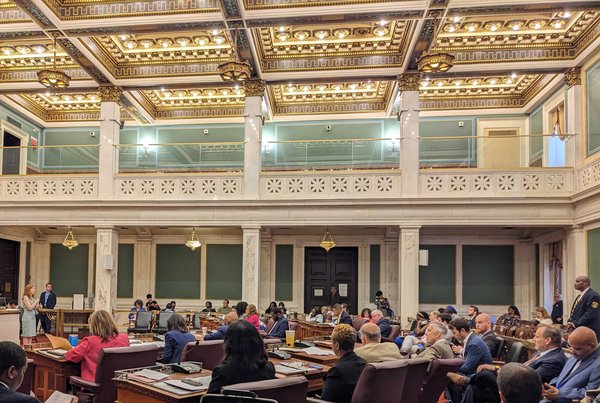Permanent protections for Philadelphia renters to help them avoid evictions appear imminent, and the Parker administration says funding will be included in the next budget to support the program.
Councilmembers approved a bill on Thursday that would make the city's eviction diversion program permanent. The legislation, originally enacted to keep people housed during the pandemic, does not eliminate evictions, but it gives tenants 30 days of protection and requires mediation sessions between tenants and their landlords before the situation proceeds to landlord-tenant court.
MORE: Amazon gets zoning approval for massive data center campus in Luzerne County
The bill passed 16-1. Councilmember Brian O'Neill, a Republican who represents District 10 in Northeast Philly, was the sole no vote. Mayor Cherelle Parker has said she supports making the eviction diversion program — or EDP — permanent, but the success of the program depends on funding for the city's Targeted Financial Assistance program — which, for eligible landlords and tenants in the EDP, provides money equal to the amount the tenant owes in back rent plus one additional month's rent to resolve the situation.
Late Thursday afternoon, Jamila Davis, spokesperson for the city's Department of Planning and Development and the Philadelphia Housing Development Corp., said EDP is "a significant success story that has attracted national attention and is serving as a model for other cities."
"DPD did testify during a hearing on the bill that the city has other funds available that will enable Targeted Financial Assistance to be provided at current levels through the end of FY25," Davis said. "The DPD testimony also noted that continued funding for EDP and TFA after FY25 will need to be part of annual budget negotiations between Council and the Mayor's Office."
Fiscal year 2025 starts Oct. 1, 2024 and ends Sept. 30, 2025.
Under EDP, before a tenant can be evicted, tenants and landlords need to try mediation sessions, direct negotiations or financial assistance programs. Both parties are required to participate "in good faith." If the two sides can't come to an agreement or a tenant doesn't show up to the mediation sessions, then landlords can pursue eviction through court.
The original EDP legislation was introduced in 2020 by Councilmembers Kendra Brooks and Jamie Gauthier and former Councilmember Helen Gym to protect tenants who lost jobs and income during the pandemic. According to their offices, the program prevents 10,000 evictions each year.
"As a housing counselor, there is only one metric I think about, and that is the benefit of keeping people housed at a time when affordable housing is scarce," Abraham Reyes Pardo, vice president at the Urban League of Philadelphia, said during the council meeting.
EDP helped aid a healthy housing market, Reyes Pardo said, while private equity firms were "exacerbating its condition" by buying housing units, raising rents and evicting tenants.
Supporters consider the eviction diversion as a win-win: It lets tenants set up a payment plan and avoid evictions while also bringing less eviction cases to court and saving landlords and tenants the expense of legal fees involved in court proceedings. Also, a tenant with an eviction record from a case that goes to landlord-tenant court can make it more difficult for that person to find an apartment.
"An eviction court filing, regardless of outcome, can prevent someone from accessing safe and affordable housing," according to the testimony of Sabrina Geary, a paralegal at Community Legal Services, to City Council. Geary added that landlords and tenants in mediations reached agreements in 70% of cases she saw.
The program is considered complete for both parties after an agreement has been reached, or 30 days have gone by. Sue Wasserkrug, who leads mediation for EDP at CORA Services, said her organization reviews 500 to 600 eviction diversion applications weekly. For her, its not only a practical program, but one that lifts communities.
"It's not just landlords and tenants who are winners, the court benefits from more manageable dockets and the entire community benefits by making a real different in our efforts to combat housing insecurity and social inequality," Wasserkrug said.
Philadelphia's program got a nod from the White House for standing out amongst eviction diversion programs across the country.

